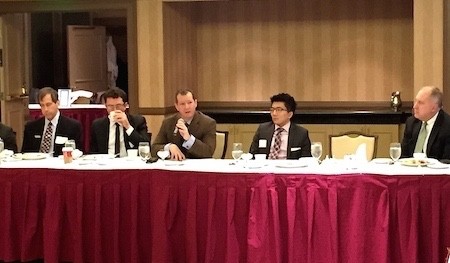
The rise of China’s steel industry, many in Pittsburgh and other steel towns argued, had undermined America’s competitiveness. Jobs were lost. Growth prospects looked dim. And what was more, some maintained, China’s rise had undermined America’s steel industry on the basis of unfair and anti-competitive trade practices.
The rise of China’s steel industry was not the sole reason Pittsburgh’s “old” economy was forced to adapt. Technological changes and corporate raids and restructurings also played a role. But skepticism of China among US steel producers runs deep: the United Steelworkers union has supported an array of suits against Beijing in recent years, on issues ranging from tires, to steel pipes, to solar panels.
Pittsburgh, meanwhile, has adapted to economic challenge and change. Today, the city’s economy is a complex patchwork of new and innovative industries, including clean energy, advanced automation, financial services and nuclear engineering. And the Marcellus Formation, which extends across the Appalachian Basin, has made the state of Pennsylvania a major hub of America’s shale gas boom.
That is a source of comparative advantage—and the basis for potentially new and far-reaching tie-ups with China, which is seeking to make significant shale and other energy-related investments overseas, especially in gas-related technology and business know-how. Chinese firms, facing headwinds in their domestic market and trade tensions internationally, have sought to establish themselves in the United States.
On November 17, the Paulson Institute and the Economic Club of Pittsburgh jointly convened a meeting with local corporate and market leaders to discuss these dynamics and what they mean for western Pennsylvania. Featuring the Institute’s vice chairman, Evan Feigenbaum, and fellow Damien Ma, the event was part of an ongoing series of “American Competiveness Dialogues” that the Institute has sponsored in cities as diverse as Detroit, Michigan and Kearney, Nebraska.
“Foreign direct investment can be an opportunity for states and cities,” says Feigenbaum. “Many presume that ‘investment’ means mergers and acquisitions, but that is understandably controversial and is by no means the only model. Greenfield investments that establish plants or create new assets can be meaningful to local communities. And growth capital can support the development of smaller companies who have less access to the capital markets. The key is that investments, whether in Pittsburgh or Paducah, need to be anchored in local realities.”
That is one reason the Paulson Institute has focused its investment-related programs at the state level rather than on Washington or Wall Street. The Institute is working with several governors and their teams and conducting competitiveness dialogues in Pittsburgh and beyond.
Discussion in Pittsburgh focused on how China’s diversification away from coal is driving Chinese investors overseas in search of technology plays and resource deals, especially in advanced economies like the United States. The group addressed how Pennsylvania might benefit from such investments, particularly in shale gas and other energy-related technologies, as well as the challenges that America faces from Chinese competition and how firms and communities can adapt and successfully compete, as Saginaw, Michigan, did when Chinese entities bought Nexteer, a top auto parts company.
Chinese investment in the United States has stirred debate about the economic, political, and national security implications. But those discussions too often are generic or take place at 100,000 feet. The Paulson Institute Competitiveness Dialogues anchor discussion in local conditions, underlying economics, and the real challenges faced by real communities across the United States. Future dialogues are being planned for 2015 in southern, western, and Great Plains states.


